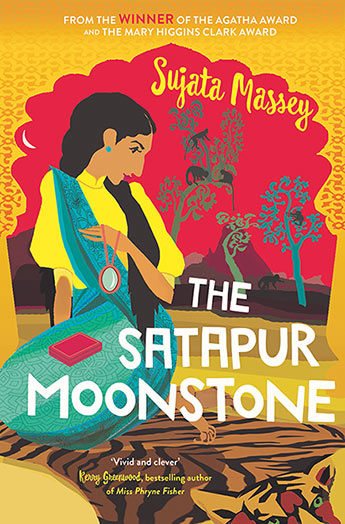Author: Sujata Massey
Publisher/Year: Allen & Unwin/2019
Publisher description
The delightfully clever Perveen Mistry, Bombay’s first female lawyer, returns in an adventure of treacherous intrigues and suspicious deaths.
India, 1922: It is rainy season in the lush, remote Sahyadri Mountains southeast of Bombay, where the kingdom of Satapur is tucked away. A curse has fallen upon Satapur’s royal family, whose maharaja and his teenage son are both dead. The kingdom is now ruled by an agent of the British Raj on behalf of Satapur’s two maharanis, the dowager queen and the maharaja’s widow.
The royal ladies are in dispute over the education of the young crown prince, and a lawyer’s council is required – but the maharanis live in purdah and do not speak to men. Just one woman can help them: Perveen Mistry.
Perveen is determined to bring peace to the royal house, but when she arrives she finds that the Satapur palace is full of cold-blooded power plays and ancient vendettas. Too late, she realises she has walked into a trap. But whose? And how can she protect the royal children from the deadly curse on the palace?
Reviewer: Narrelle Harris
It’s 1922 and Perveen Mistry, a lawyer from Bombay, has been called to the kingdom of Satapur to help resolve a conflict about an underage maharajah’s education. Jiva Rao’s mother and grandmother disagree bitterly on the best choice and as they’re observing purdah, Perveen, a woman, is the only lawyer who can visit them.
Along with trying to understand everyone’s perspectives so that a fair decision can be reached, Perveen soon learns that the circumstances of how Jiva Rao’s father and older brother died are dodgy, to say the least. Other factors add complexity to what should be a simple legal consultation – including the relationship between colonial British influence in what is nominally an independent kingdom and the royal household; Perveen’s unexpected attraction to the local agent of the British Raj; and the complex layers of social behaviours when the characters populating the story are from a huge variety of religious, cultural, social and class backgrounds.
Sujata Massey’s Perveen is the perfect guide through this complicated landscape. Educated in England, politically aware, articulate and thoughtful, Perveen explores the layers and facets of 1920s India. She’s an outsider in more ways than one – a woman, a lawyer, a Parsi with personal history she’s not in a hurry to share, a quiet supporter of Ghandi, and an ordinary citizen trying to negotiate with a royal household conscious of its status but also how that status is peculiarly beholden to British powers.
The Satapur Moonstone is wonderfully textured in its characters and their interactions. It shows off India’s multiplicity as a nation without getting heavy handed or lecturing, because we see it all through Perveen’s eyes, and for her, it’s all India too. Descriptions of the Agent’s station and its staff and the social circle surround it, are as vivid as those of the other locals, the jungle and the palace.
The mystery evolves at a good pace – slowly at first, while we (through Perveen) grow to understand all the players and to realise that everyone has secrets. As these get untangled, the pace of the plot picks up and dashes us towards a satisfying conclusion.
I’d finished The Satapur Moonstone before I realised that Perveen had first appeared in A Murder at Malabar Hill. Not having read it is no barrier to enjoying this book – but I’ll certainly be picking it up now!
